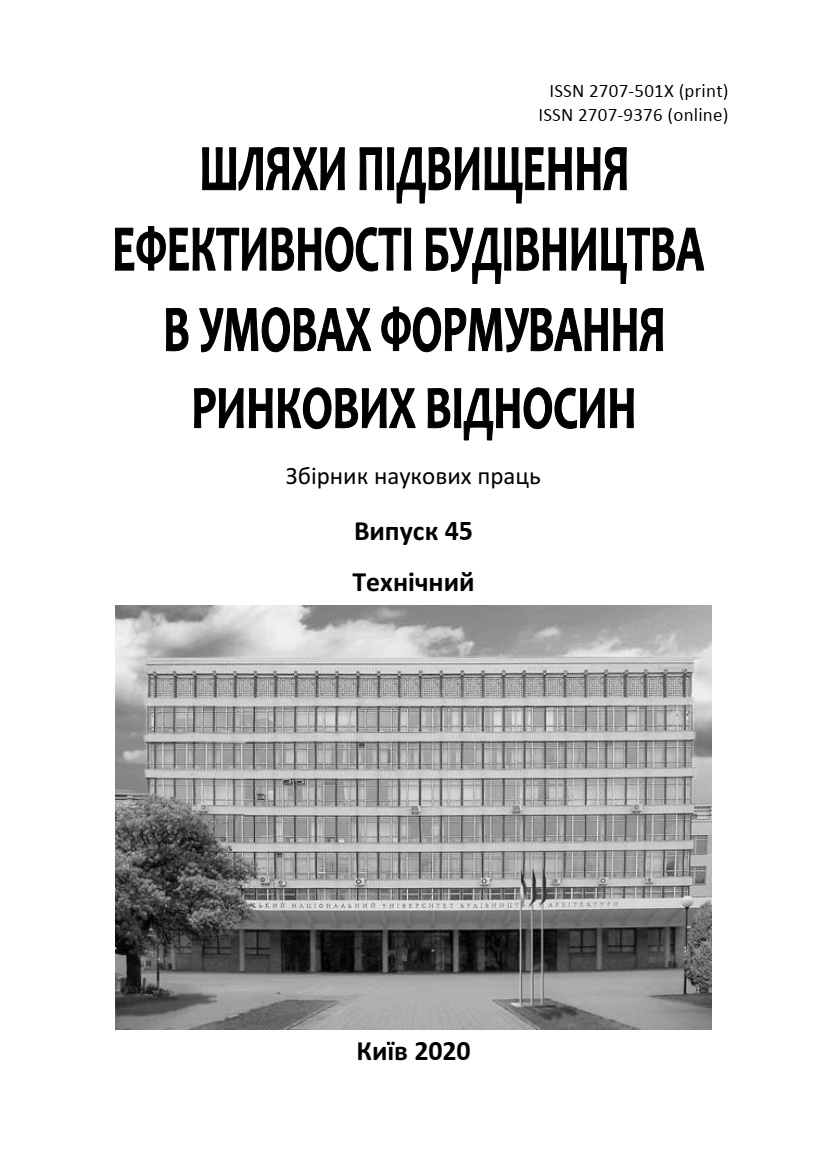Institutional environment as a precondition for improving the technological progress of construction
DOI:
https://doi.org/10.32347/2707-501x.2020.45.46-56Keywords:
contractual relations in capital construction, conditions for concluding and the subject of a contract, types of contracts, terms of performance of work (construction of facilities), contract price, customer’s rights, contract for design and research work, assessment of the effectiveness of optionsAbstract
The legislation of Ukraine on the regulation of urban planning activities establishes the legal and organizational foundations of urban planning activities, which are aimed at ensuring sustainable development of territories, taking into account State, public and private interests. In accordance with the legislative acts, a number of government decrees, orders of the Ministry of Development of Communities and Territories of Ukraine (formerly - the Ministry of Regional Development of Ukraine), state building codes (new or amended from among the current ones) have been developed.
There is an urgent need to analyze the situation and further improve the legal regulation of construction, including permitting and approval procedures for the organization and management of construction in accordance with legislation and regulations, adaptation of regulatory policy to European standards as a prerequisite for improving organizational and technological processes of construction and determining their effectiveness.
Based on this goal, the following set of issues is consistently considered: contractual relations in capital construction; main participants in the construction - the customer and contractor, investor, developer, etc .; conditions for concluding a contract; terms of performance of works (construction of object); calendar schedule of works; contract price and estimated cost of construction; types of contracts and their characteristics; the rights of the customer and the contractor; contracts for design and research work; methods of economic evaluation of options for the organization of technological processes of construction.
Currently, work is underway to improve the legislation on the organization of construction activities, namely: architectural and construction control and supervision, permitting procedures in construction, licensing, self-regulation in urban planning, electronic systems and BIM-technology, technical regulation in construction and more. In this regard, the current guidelines will be clarified with the release of new laws and regulations.
References
Цивільний кодекс України від 16.01.2003 № 435 – ІV (Редакція станом на 04.11.2018 р.).
Господарський кодекс України від 16.01.2003 № 436 – VІ (Редакція станом на 10.11.2018.).
Загальні умови укладання та виконання договорів підряду в капітальному будівництві. Затверджено Постановою Кабінету Міністрів України від 01.08.2005 р. № 668. З урахуванням змін, внесених згідно з Постановою № 1390 від 28.12.2011 р. «Про внесення змін до деяких актів Кабінету Міністрів України».
«Рекомендації зі складання додатків до договору підряду в капітальному будівництві». Додаток до наказу Мінрегіонбуду від 13.01.2009 р. № 2.
ДБН А.3.1.-5-2016. Організація будівельного виробництва. Чинні з 01.07.2016 р.
ДСТУ БД. 1-1-1:2013. «Правила визначення вартості будівництва». Чинні з 01.01.2014 р. (Зміна № 2 від 16 квітня 2018 року).
Инструкция по определению годового экономического эффекта, получаемого в результате внедрения новой техники в строительстве. СН 248-63: Утв. 6 июля 1963 г. / Госстрой СССР. М., 1965. 67 с.
Инструкция по определению экономической эффективности капитальных вложений в строительстве. СН 423-71. : Утв. 31.05.1971 г. / Госстромй СССР. М: Стройиздат, 1979. 40 с.
Downloads
Published
How to Cite
Issue
Section
License
Copyright (c) 2021 R. Zeltser

This work is licensed under a Creative Commons Attribution 4.0 International License.
Authors who publish with this journal agree to the following terms:
- Authors retain copyright and grant the journal right of first publication with the work simultaneously licensed under a Creative Commons Attribution License that allows others to share the work with an acknowledgement of the work's authorship and initial publication in this journal.
- Authors are able to enter into separate, additional contractual arrangements for the non-exclusive distribution of the journal's published version of the work (e.g., post it to an institutional repository or publish it in a book), with an acknowledgement of its initial publication in this journal.
- Authors are permitted and encouraged to post their work online (e.g., in institutional repositories or on their website) prior to and during the submission process, as it can lead to productive exchanges, as well as earlier and greater citation of published work (See The Effect of Open Access).

